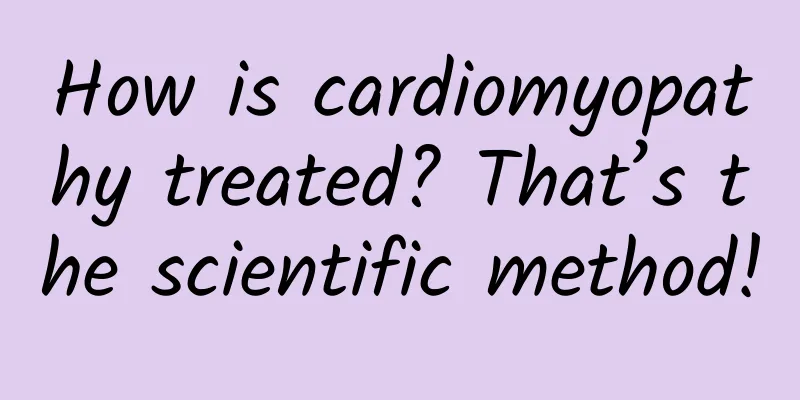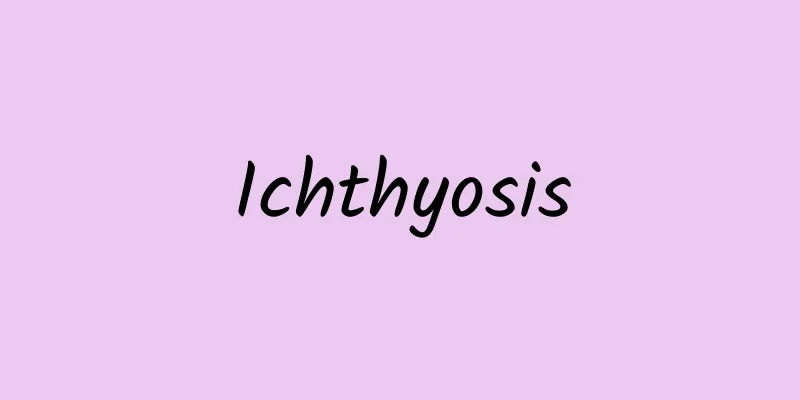How is cardiomyopathy treated? That’s the scientific method!

|
As people age, their myocardial function will continue to deteriorate, and obvious heart failure will occur, leading to cardiomyopathy. Therefore, middle-aged and elderly people are more likely to suffer from cardiomyopathy, and many people even die from this disease. Therefore, we must do relevant preventive work in our daily lives. If cardiomyopathy occurs, we can use the following methods to treat it. 1. General treatment Patients with heart failure should emphasize bed rest. Elderly patients can slow down their heart rate, reduce or alleviate the cardiac load, and prolong cardiac diastole time to facilitate venous return and increase myocardial blood supply. At the same time, oxygen consumption is reduced, cardiac function is improved, and special attention should be paid to actively preventing and treating respiratory tract infections to minimize the chance of inducing heart failure. Once a respiratory tract infection occurs, antibiotics, expectorants, and antiasthmatic measures should be used as soon as possible to control it. In addition, appropriate oxygen inhalation to replenish energy, electrolyte supplementation (potassium, magnesium), antiarrhythmic and anticoagulant measures should be taken. 2. Cardiotonic drugs (1) Clinical practice of digitalis preparations has shown that digitalis cardiotonic agents are still the first-line drugs for the treatment of heart failure. For elderly patients with cardiomyopathy who suffer from heart failure and rapid atrial fibrillation, this medicine can have a good effect in strengthening the heart and adjusting the heart rhythm. Small doses of sediginol C (Digoxin) or digoxin are administered, but the elderly are prone to hypoxemia, and their sensitivity to digitalis increases when their myocardial disease occurs. In addition, the elderly often have impaired renal function, so small doses should be used to avoid digitalis poisoning. (2) Other positive inotropic drugs In recent years, non-digitalis cardiotonic agents have been used to treat heart failure with good results. Among them, the bipyridine derivative, amrinone, can inhibit the activity of phosphodiesterase in myocardial cells and increase the intracellular cAMP content. Intravenous infusion can eliminate the reflex sympathetic nerve excitement in patients with severe heart failure, and can directly dilate blood vessels, improve renal function, increase urine volume, reduce left ventricular filling pressure, and increase cardiac output. It may still be effective for patients with heart failure who are not responsive to digitalis. At present, it is advocated that such drugs are only suitable for patients with severe heart failure or those who have a poor response to conventional digitalis treatment, and are administered intravenously for a short period of time but not for long-term use. In addition, dopamine and dobutamine are cardiac β1 and β2 receptor stimulants, which have a strong effect on enhancing myocardial contractility and can dilate renal blood vessels, producing hemodynamic effects that are beneficial to heart and kidney function. Intravenous drip can reduce pulmonary and peripheral resistance and increase cardiac index for certain refractory heart failure, thereby achieving therapeutic effects. However, the patient must be given in small doses and closely monitored to avoid adverse reactions. 3. Beta-blockers For example, carvedilol and labetalol can block both α1-receptors and β-receptors, reduce peripheral resistance, dilate coronary arteries and renal blood vessels, and reduce pulmonary capillary wedge pressure. Pindolol and celiprolol have both peripheral vascular β1 receptor excitation, intrinsic sympathomimetic activity and mild membrane stabilizing effects, and have a mild inhibitory effect on the sinoatrial node, so they can also be used in patients with sinus bradycardia. Bucindolol can directly dilate blood vessels. After long-term treatment and follow-up, symptoms such as palpitations, shortness of breath, dyspnea, ascites, edema, etc. in elderly patients with cardiomyopathy and heart failure can be relieved, the heart can be reduced in size, and the amount of exercise can be increased. 4. Calcium antagonists When elderly patients with cardiomyopathy suffer from heart failure, there is an excessive load of calcium ion accumulation in myocardial cells and excessive energy consumption. The patient was treated with the calcium channel blocker diltiazem, which had a significant effect. 5. Vasodilators Different types of vasodilators are selected according to the patient's cardiac preload and afterload. For patients with severe venous congestion and significantly increased ventricular filling pressure, small vein dilators such as nitroglycerin and isosorbide dinitrate should be used to increase the volume of the venous system, lower venous pressure, reduce the amount of blood returning to the heart, reduce preload, and also reduce the burden on the pulmonary circulation and improve cardiac function. On the other hand, heart failure is often accompanied by peripheral vasoconstriction caused by sympathetic nerve excitement, which increases the afterload of the heart. At this time, it is advisable to use small artery dilators, such as hydralazine or phentolamine, to reduce afterload, effectively increase cardiac output, and relieve various clinical symptoms caused by low cardiac output. It can also improve the congestion state of pulmonary circulation. In addition, angiotensin-converting enzyme inhibitors (ACEI), which are widely used in clinical practice, have good and long-lasting therapeutic effects on refractory heart failure regardless of the cause and the level of plasma renin. 6. Diuretics Diuretics can play an important role. They can quickly reduce the burden on the heart and effectively relieve symptoms. They are often used in combination with cardiotonic drugs and vasodilators, and have significant effects. They have become a basic solution for the treatment of congestive heart failure. However, after the symptoms of pulmonary and systemic congestion are relieved, medication should be discontinued and electrolytes, especially blood potassium, should be tested in a timely manner. Attention should be paid to timely potassium supplementation to avoid adverse reactions such as electrolyte imbalance. |
<<: What to do if your skin is rough?
>>: What are the scientific methods for treating neurodermatitis?
Recommend
Side effects and toxicity of Cyperus rotundus
Cyperus rotundus is the name of a traditional Chi...
What is the cause of hairy tongue coating?
The tongue is very important to us, because it ca...
How much does red ginseng cost per gram
Wild ginseng contains a variety of ginsenosides a...
How to promote uterine recovery after childbirth
The uterus is the happiest moment for every woman...
The effect of drinking Sophora japonica water
Sophora japonica tea is a relatively common tea b...
Can I test for pregnancy on the seventh day of delayed menstruation?
Menstruation is a normal physiological reaction t...
Red and itchy skin
Redness and itching of the skin is a very common ...
What medicine should I take for cerebellar atrophy
Brain disease is a very serious problem and once ...
Can moxibustion sticks help lose weight?
Everyone wants to have a better figure and be mor...
What does the vaginal discharge look like when your period is coming?
The appearance of leucorrhea can be used to deter...
Bronchitis Chinese medicine
Bronchitis is a very common disease. It is usuall...
How to improve metabolic capacity
The metabolic rate is related to many factors, su...
Mole on chin
Moles on the chin, generally speaking, if there i...
The cause of excessive fire in women due to Yin deficiency
There are many reasons that lead to Yin deficienc...
What diseases can hedgehog heart cure?
The hedgehog is an animal with a strange shape be...









